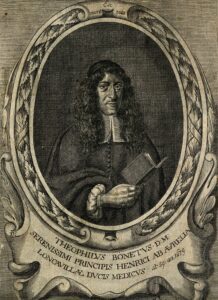 |
| Théophile Bonet. Line engraving by François Diodati, 1679. Wellcome Collection. |
Theophile Bonet was a scholar and physician remembered for his extensive writings on anatomy, pathology, and clinical medicine. A successful medical practitioner for over forty years, he was familiar with both ancient and modern literature, and he published extensive notes of his studies and observations.
Bonet was born in 1602 in Geneva, where his Protestant family had fled from religious persecution in France. After receiving a medical degree from the University of Bologna in 1643, he established a successful medical practice in his hometown. Having then achieved political and financial security, he dedicated his time to anatomical and other academic studies.1,2 He wrote a Guide to the Practical Physician, in which he advised medical practitioners to avoid raising too great of expectations in their patients or making excessive promises, never prescribe more than one medicine at a time, not change regimens too often, and not visit his patients too rarely or too frequently. His extensive treatises were based on the 3,000 autopsies he had performed. They contained references to 400 earlier authors and described in separate volumes diseases of the head, chest, and abdomen, as well as diabetes, gonorrhea, hernia, fevers, tumors, fractures, and gout. Among his clinical descriptions he included that of an obese poet who died within a few minutes of developing pain in the chest and was found on autopsy to have such very narrowing of his coronary arteries that not even the point of a needle could be inserted into them, an early description of myocardial infarction.3 He also described cases of aortic aneurysm, malaria, smallpox, and epidemic influenza.
In 1652, he became a member of the governing council of Geneva. Around the age of about seventy he became deaf and partially abandoned his practice, dedicating himself to study and writing. In 1679, he wrote The Corps de Médecine et Chirurgie, a compendium of surgery that also included articles on hydrocephalus, herpes, scabies, leprosy, skin diseases, syphilis, drowning, and “phlegm.” He translated articles for the use of practitioners, and he is regarded as one of the greatest writers of 17th century medicine.
Further reading
- Theophile Bonet (1620-1689) Physician of Geneva. JAMA 1969;210(5):899.
- Iron EE. Théophile Bonet, 1620-1689: His influence on the science and practice of medicine. Bulletin of the History of Medicine Dec 1942;12(5):623.
- White P. Coronary thrombosis. Scientific American June 1950;182, 44.
GEORGE DUNEA, MD, Editor-in-Chief
Summer 2023 | Sections | Physicians of Note

Leave a Reply